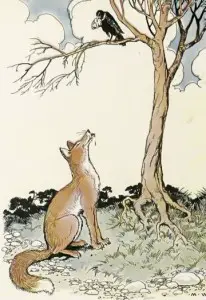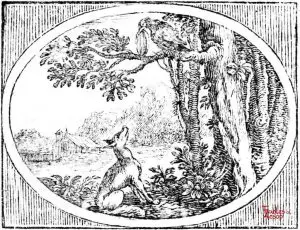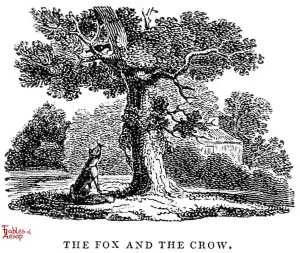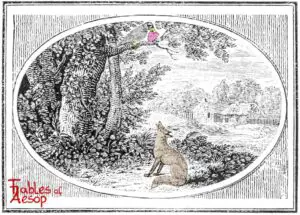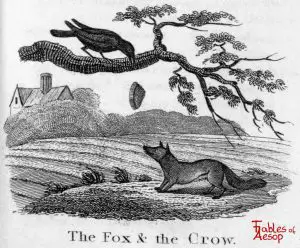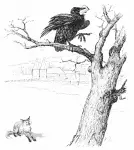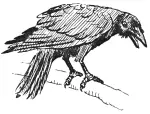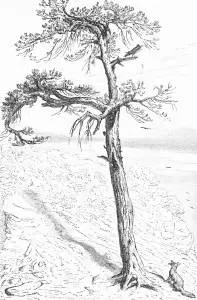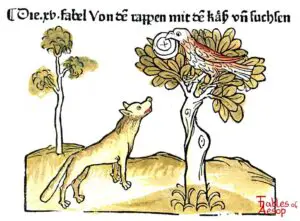A crow has cheese a fox wants. The fox asks the crow to sing. It does and drops the cheese.
Do not trust flatterers.

Aesop For Children
One bright morning as the Fox was following his sharp nose through the wood in search of a bite to eat, he saw a Crow on the limb of a tree overhead. This was by no means the first Crow the Fox had ever seen. What caught his attention this time and made him stop for a second look, was that the lucky Crow held a bit of cheese in her beak.
“No need to search any farther,” thought sly Master Fox. “Here is a dainty bite for my breakfast.”
Up he trotted to the foot of the tree in which the Crow was sitting, and looking up admiringly, he cried, “Good-morning, beautiful creature!”
The Crow, her head cocked on one side, watched the Fox suspiciously. But she kept her beak tightly closed on the cheese and did not return his greeting.
“What a charming creature she is!” said the Fox. “How her feathers shine! What a beautiful form and what splendid wings! Such a wonderful Bird should have a very lovely voice, since everything else about her is so perfect. Could she sing just one song, I know I should hail her Queen of Birds.”
Listening to these flattering words, the Crow forgot all her suspicion, and also her breakfast. She wanted very much to be called Queen of Birds.
So she opened her beak wide to utter her loudest caw, and down fell the cheese straight into the Fox’s open mouth.
“Thank you,” said Master Fox sweetly, as he walked off. “Though it is cracked, you have a voice sure enough. But where are your wits?”
Moral
The flatterer lives at the expense of those who will listen to him.

Samuel Croxall
A CROW having taken a piece of cheese out of a cottage window, flew up into a high tree with it, in order to eat it; which the Fox observing, came and sat underneath, and began to compliment the Crow upon the subject of her beauty. I protest, says he, I never observed it before, but your feathers are of a more delicate white than any that ever I saw in my life! Ah! what a fine shape and graceful turn of body is there! And I make no question but you have a tolerable voice. If it is but as fine as your complexion, I do not know a bird that can pretend to stand in competition with you. The Crow, tickled with this very civil language, nestled and riggled about, and hardly knew where she was; but, thinking the Fox a little dubious as to the particular of her voice, and having a mind to set him right in that matter, began to sing, and, in the same instant let the cheese drop out of her mouth. This being what the Fox wanted, he chopped it up in a moment; and trotted away, laughing to himself at the easy credulity of the Crow.
THE APPLICATION.
They that love flattery (as it is to be feared, too many do) are in a fair way to repent of their foible at tbe long run. And yet how few are there, among the whole race of mankind, who may be said to be full proof against its attacks! the gross way by which it is managed, by some silly practitioners, is enough to alarm the dullest apprehension, and make it to value itself upon the quickness of its insight into the little plots of this nature. But, let the ambuscade be disposed with due judgment, and it will scarce fail of seizing the most guarded heart. How many are tickled to the last degree with the pleasure of flattery, even while they are applauded for their honest detestation of it! There is no way to baffle the force of this engine, but by every one’s examining impartially for himself the true estimate of his own qualities: if he deals sincerely in the matter, nobody can tell, so well as himself, what degree of esteem ought to attend any of his actions; and therefore he should be entirely easy, as to the opinion men are like to have of them in the world. If they attribute more to him than is his due, they are either designing or mistaken; if they allow him less, they are envious, or possibly, still mistaken; and, in either case, are to be despised, or disregarded. For he that flatters without designing to make advantage of it, is a fool: and whoever encourages that flattery which he has sense enough to see through, is a vain coxcomb.

Thomas Bewick
A Crow Laving taken a piece of meat out of a cottage window, flew up into a tree with it; which a Fox observing, came underneath, and began to compliment the Crow upon her beauty. I protest, says he, your feathers are of a more delicate white than I ever saw in my life! Ah! what a fine shape and graceful turn of body is there! and I make no question but you have a tolerable voice: if it be but as fine as your complexion, I do not know a bird that can stand in competition with you. The Crow, tickled with this very civil language, wriggled about, and hardly knew where she was; and having a mind to convince the Fox in the matter of her voice, attempted to sing, and in the same instant let the meat drop out of her mouth. This being what the Fox wanted, he chopped it up in a moment, and trotted away, laughing at the easy credulity of the Crow.
APPLICATION.
"It is a maxim in the schools,
That flattery is the food of fools."
They that love flattery will have cause to repent of their foible in the long run; and yet how few there are among the whole race of mankind, who are proof against its attacks. The gross way in which it is managed by some silly practitioners, is enough to alarm the dullest apprehension; but let the ambuscade be disposed with judgment, and it will scarcely fail of seizing the most guarded heart. How many are tickled to the last degree with the pleasure of flattery, even while they are applauded for their honest detestation of it. There is no way to baffle the force of this engine, but by every one’s examining impartially for himself, the true estimate of his own qualities. If he deal sincerely in the matter, nobody can tell so well as himself, what degree of esteem ought to attend any of his actions; and therefore he should be entirely easy as to the opinion others have of them. If they attribute more to him than is his due, they are either designing, or mistaken; if they allow him less, they are envious, or possibly still mistaken; and in either case are to be despised or disregarded: for he that flatters without designing to make advantage of it, is a fool; and whoever encourages that flattery which he has sense enough to see through, is a vain coxcomb.

Eliot/Jacobs Version
A Fox once saw a Crow fly off with a piece of cheese in its beak and settle on a branch of a tree. “That’s for me, as I am a Fox,” said Master Reynard, and he walked up to the foot of the tree.
“Good-day, Mistress Crow,” he cried. “How well you are looking to-day: how glossy your feathers; how bright your eye. I feel sure your voice must surpass that of other birds, just as your figure does; let me hear but one song from you that I may greet you as the Queen of Birds.”
The Crow lifted up her head and began to caw her best, but the moment she opened her mouth the piece of cheese fell to the ground, only to be snapped up by Master Fox. “That will do,” said he. “That was all I wanted. In exchange for your cheese I will give you a piece of advice for the future: “Do not trust flatterers.”

Jefferys Taylor
CROWS feed upon worms: yet an author affirms,
Cheshire cheese they will get if they’re able,
“For,” said he, “I well know, one unprincipled crow,
Once purloin’d a large piece from my table.”
Then away darted she, to the shade of a tree,
To deposit the booty within her;
But it never occur’d to the mind of the bird
That a fox was to have it for dinner.
“How many a slip, ‘twixt the cup and the lip!”
(Excuse me, I pray, the digression.)
Said a fox to himself, “I can share in the pelf,
If I act with my usual discretion.”
So said he, “Is’t you? pray, ma’am, how do you do,
I have long wish’d to pay you a visit;
For a twelvemonth has pass’d since I heard of you last,
Which is not very neighbourly, is it?
“But, dear madam,” said he, “you are dining, I see,
On that subject I’d ask your advice:
Pray, ma’am, now can you tell, where provisions they sell,
That are not an extravagant price.
—”Bread and meat are so dear, and have been for a year,
That poor people can scarcely endure it;
And then cheese is so high, that such beggars as I,
Till it falls, cannot hope to procure it.”
But the ill-behaved bird did not utter a word,
Still intent on retaining her plunder;
Thought the fox, “it should seem this is not a good scheme,
What else can I think of, I wonder?”
So said Reynard, once more, “I ne’er knew it before,
But your feathers are whiter than snow is!”
But thought he, when he’d said it, “she’ll ne’er give it credit,
For what bird is so black as a crow is.”
“But I’m told that your voice is a horrible noise,
Which they say of all sounds is the oddest;
But then this is absurd, for it never is heard,
Since you are so excessively modest.”
“If that’s all,” thought the crow, “I will soon let you know,
That all doubt on that score may be ended;”
Then most laughably piped, this poor silly biped,
When quickly her dinner descended!
If this biped had not been so vain and conceited,
She would not by the fox quite so soon have been cheated;
But perhaps the term biped to some may be new:
‘Tis a two-legged creature—perchance it is you.

Caldecott
A Crow stole a piece of cheese and alighted with it on a tree. A Fox watched her, and wishing to get hold of the cheese stood underneath and began to make compliments upon her size and beauty; he went so far as to say that she had the best of claims to be made Queen of the Birds, and doubtless it would have been done if she had only had a voice. The Crow, anxious to prove to him that she did possess a voice, began to caw vigorously, of course dropping the cheese. The Fox pounced upon it and carried it off, remarking as he went away, “My good friend Crow, you have every good quality: now try to get some common sense.”

JBR Collection
A Crow having stolen a piece of cheese from a cottage window, flew with it to a tree that was some way off. A Fox, drawn by the smell of the cheese, came and sat at the foot of the tree, and tried to find some way of making it his. “Good morning, clear Miss Crow,” said he. “How well you are looking to-day! What handsome feathers yours are, to be sure! Perhaps, too, your voice is as sweet as your feathers are fine. If so, you are really the Queen of Birds.” The Crow, quite beside herself to hear such praise, at once opened a wide beak to let the Fox judge of her voice, and so let fall the cheese. The Fox snapped it up, and exclaimed, “Ah! ah! my good soul, learn that all who flatter have their own ends in view. That lesson will well repay you for a bit of cheese.”

Townsend version
A crow having stolen a bit of meat, perched in a tree and held it in her beak. A Fox, seeing this, longed to possess the meat himself, and by a wily stratagem succeeded. “How handsome is the Crow,” he exclaimed, in the beauty of her shape and in the fairness of her complexion! Oh, if her voice were only equal to her beauty, she would deservedly be considered the Queen of Birds!” This he said deceitfully; but the Crow, anxious to refute the reflection cast upon her voice, set up a loud caw and dropped the flesh. The Fox quickly picked it up, and thus addressed the Crow: “My good Crow, your voice is right enough, but your wit is wanting.”

L’Estrange version (A Fox and A Raven)
A certain fox spy’d out a raven upon a tree with a morsel in his mouth, that set his chops a watering; but how to come at it was the question. Ah thou blessed bird! (says he) the delight of gods, and of men! and so he lays himself forth upon the gracefulness of the ravens person, and the beauty of his plumes; his admirable gift of augury, &c. And now, says the fox, if thou hadst but a voice answerable to the rest of thy excellett qualities the sun in the firmament could not shew the world such another creature. This nauseous flattery sets the raven immediately a gaping as wide as ever he could stretch, to give the fox a taste of his pipe; but upon the opening of his mouth, he drops his breakfast, which the fox presently chopt up and then bad him remember, that whatever he had said of his beauty, he had spoken nothing yet of his brains.
Moral
There’s hardly any man living that may not be wrought upon more or less by flattery: for we do all of us naturally overween in our own favour: but when it comes to be apply’d once to a vain fool, it makes him forty times an arranter sot than he was before.

Crane Poetry Visual
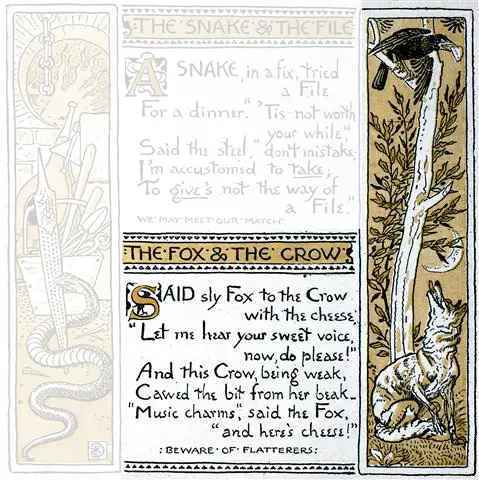
Said sly Fox to the Crow with the cheese,
“Let me hear your sweet voice, now, do please!”
And this Crow being weak,
Cawed the bit from her beak.
“Music charms,” said the Fox, “and here’s cheese!”
Beware of flatterers.

Heinrich Steinhöwel (Of the Crow and the Fox)

Corvus et Vulpes Adulatrix
Corvus alicunde caseum rapuerat et cum illo in altam arborem subvolarat. Vulpecula, illum caseum appetens, corvum blandis verbis adoritur, cumque primum formam eius pennarumque nitorem laudasset, “Pol,” inquit, “te avium regem esse dicerem, si cantus pulchritudini tuae responderet.” Tum ille, laudibus vulpis inflatus, etiam cantu se valere demonstrare voluit. Ita vero e rostro aperto caseus delapsus est, quem vulpes arreptum devoravit.
Moral
Haec fabula docet vitandas esse adulatorum voces, qui blanditiis suis nobis insidiantur.
Perry #124
